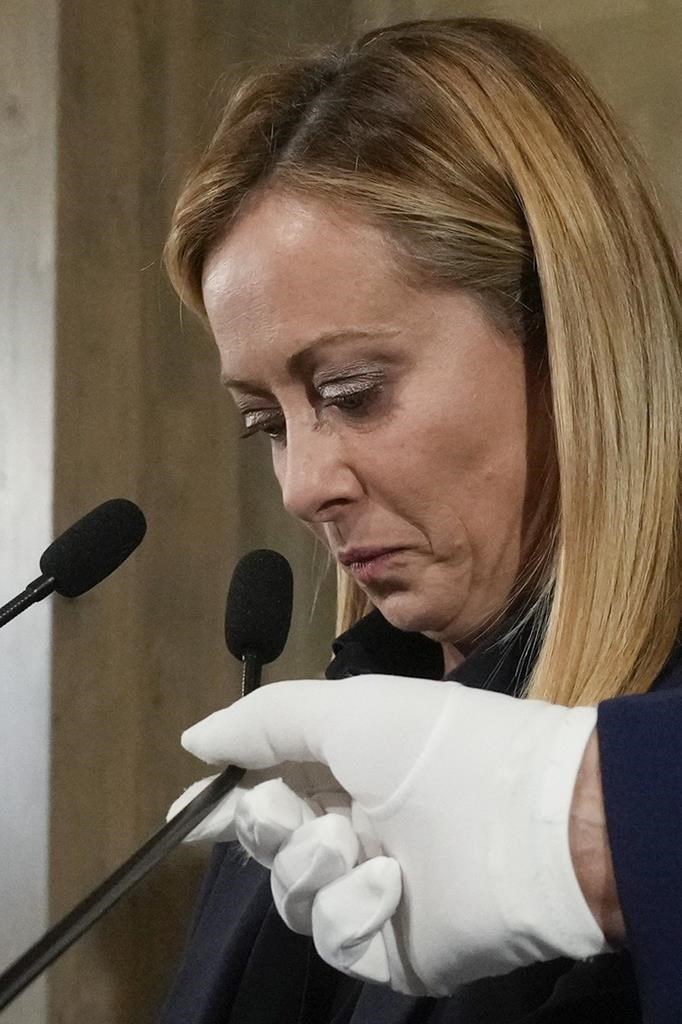MILAN (AP) — As Giorgia Meloni becomes Italy’s first female premier, the world is watching closely to see whether she will emerge as a firebrand leader of a far-right party with neo-fascist roots or the more moderate right-wing politician who succeeded in capturing 26% of the vote.
Here is a look at some of the issues facing Meloni’s new government, formed of her far-right Brothers of Italy Party, along with the right-wing populist League led by Matteo Salvini and the center-right Forza Italia headed by three-time former premier and media mogul Silvio Berlusconi:
THE ENERGY CRISIS
The squeeze facing Italian industry and households will require urgent attention, as concerns grow that astronomically high bills will force business closures and household rationing.
Italy’s Confindustria business lobby has warned that thousands of businesses are at risk as industrial energy costs rose from 8 billion euros ($7.87 billion) in 2019 to 100 billion euros this year.
Meloni has backed a European price cap on Russian gas.
Her coalition partner, League leader Matteo Salvini, has pushed for Italy to take on more debt to help households and small- and medium-size business owners that are the backbone of his party’s constituency in the wealthy north.
RELATIONS WITH THE EUROPEAN UNION
Italy’s European Union partners will be watching closely to see whether Meloni’s right-wing government will align with a nationalist block, including Hungary and Poland, that has repeatedly attacked EU democratic standards.
Meloni has recently signaled Poland as a key ally for Italy in a speech to a Spanish far-right rally, where she also singled out the success of the far-right in Sweden. Meloni also has hinted at a desire to limit the EU’s influence.
“We need a braver Europe when it is time to ... respond to big crises and big international scenarios, and a little more humble when it comes to aspects of our daily lives that could be dealt with much better at a national level,’’ she told the VOX party rally.
On Friday, Meloni chose as foreign minister Antonio Tajani, a pro-EU politician and former president of the European parliament.
ECONOMY AND THE SPECTER OF RECESSION
The spiking price of energy, compounded by inflation on household goods, is raising the specter of recession.
Official third quarter numbers won’t be in until Oct. 31, but calculations by parliament’s budget office indicates Italy’s economy shrank 0.2% from July-September and a further contraction is forecast for the final quarter.
Meloni is tasked with reducing Italy’s public debt, currently the second-highest in the eurozone at 150% of GDP, while maintaining budget stability.
Also, the right-wing League aims to do away with a 10-year-old pension reform that raised the retirement age. And it will be up to the new government to complete a planned sale of a majority stake in ITA Airways to a U.S.-led consortium.
Meloni's new finance minister is Giancarlo Giorgetti, one of the most moderate League leaders. He is seen as a likely guarantor of the continuity of the economic strategies of outgoing Premier Mario Draghi, in whose government he served as industry minister.
CIVIL RIGHTS AND MIGRATION
Women and minority groups in Italy, from the LGBTQ community to immigrants, fear their rights will be curtailed under a Meloni government. Days after her election, thousands marched through Rome and Milan in support of access to abortion, which many worry will be eroded under Meloni.
Meloni has said she wants to provide alternatives to abortion while promoting Italy's birth rate, among the lowest in the world.
Meloni has slammed what she calls the “LGBT lobby,” and her party’s program states it is against gay marriage, gay adoption and surrogate motherhood.
On Friday, she tapped ultra-conservative Catholic Eugenia Maria Roccella as minister for family, birthrates and equal opportunities. In 2018, Roccella pledged to work against Italy’s law legalizing same-sex civil unions.
Meloni is also against granting automatic citizenship to children of immigrants born in Italy, and she has harshly criticized economic migrants, calling for a naval blockade to prevent their boats from leaving northern Africa.
EUROPEAN RECOVERY FUNDS
As the EU country with the hardest-hit economy due to a draconian 2020 pandemic lockdown, Italy has access to some 220 billion euros in recovery funds from Brussels.
Former Premier Mario Draghi secured some 70 billion euros of that total during his tenure, and the new government must ensure Italy gets the rest of the money.
Italy and its sluggish bureaucracy has traditionally failed to capture a significant amount of EU funds it has been allocated. The recovery funds are mostly aimed at helping accelerate green transition, improving digitalization, and infrastructure projects.
Meloni has raised concerns by saying that she may want to redirect funds in line with her government’s priorities, without specifying how these may differ.
WILL THE COALITION HOLD?
A leaked audio tape of Berlusconi bragging about his friendship with Russian President Vladimir Putin has raised questions about Italy’s allegiances.
Meloni sought to quash any concerns about Italy’s position on the war in Ukraine with a strong statement underlining support for Kyiv and emphasizing there was no room for dissent on that position, even at the cost of not forming a right-wing government.
Still, the 86-year-old Berlusconi’s damaging braggadocio creates concern about the longevity of her government. The former premier has shown signs of chafing under Meloni’s leadership, calling her “arrogant” in notes photographed from the Senate balconies.
Many analysts believe Salvini, whose party was severely weakened in the last elections, will be the more difficult partner. He already brought down one government, led by former Premier Giuseppe Conte, in a ham-handed power grab that cost him his post as interior minister.
Salvini had lobbied for the interior ministry portfolio under Meloni, but on Friday she gave the job to a longtime ministry official, Matteo Piantedosi.
Colleen Barry, The Associated Press




